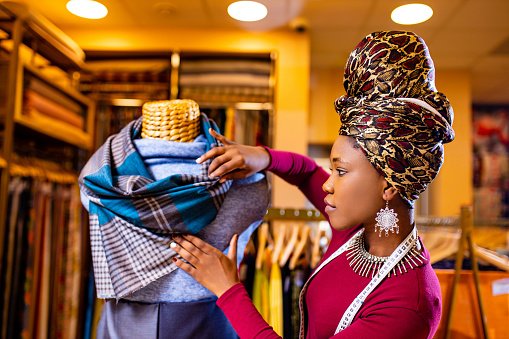Introduction.
Starting a clothing business in Nigeria can be a lucrative venture, as the country is home to a large population that is always in need of new and trendy clothing options.
However, like any business, starting a clothing business in Nigeria requires careful planning and execution to be successful.
To begin with, it’s important to conduct thorough research on the clothing industry in Nigeria, including the latest fashion trends, target market, competition, and pricing strategies.
This information will help you develop a solid business plan, which should include your brand identity, product range, marketing strategies, and financial projections.
Once you have a business plan in place, you’ll need to register your business with the Corporate Affairs Commission (CAC) and obtain all necessary licenses and permits from relevant regulatory bodies.
You’ll also need to secure a location for your store or decide whether to operate online only.
The next step is to source your inventory, which may involve partnering with local manufacturers, suppliers, or wholesalers.
You’ll also need to develop a pricing strategy that takes into account your production costs, target market, and competition.
To attract customers, you’ll need to invest in marketing and advertising strategies, such as social media marketing, influencer collaborations, and promotional events.
You may also need to hire staff, such as sales associates and tailors, depending on the size of your business.
In summary, starting a clothing business in Nigeria requires a combination of creativity, business acumen, and hard work.
With the right planning, execution, and perseverance, you can build a successful brand that caters to the needs of Nigeria’s fashion-conscious population.
What is a Clothing Business?
A clothing business refers to a commercial enterprise that designs, manufactures, sells, and distributes clothing items to consumers.
Clothing businesses can range from small, home-based operations to large multinational corporations that produce and distribute clothing items on a global scale.
The clothing industry includes a wide range of products, including formal wear, casual wear, sportswear, children’s clothing, accessories, and more.
Clothing businesses may specialize in one or more of these product categories, depending on their target market and expertise.
To be successful, a clothing business must have a strong understanding of fashion trends, consumer preferences, and production processes.
They must also have a solid business plan that takes into account factors such as sourcing materials, production costs, pricing strategies, marketing and advertising, and distribution channels.
Overall, a clothing business is a complex enterprise that requires a combination of creativity, innovation, and business acumen to thrive in today’s competitive market.
Why Should I Start a Clothing Business In Nigeria?
Nigeria is a country of over 200 million people, and its fashion industry is one of the largest and most vibrant on the African continent.
Starting a clothing business in Nigeria is a promising opportunity for entrepreneurs, as it provides a large market for fashion products, ranging from formal wear to casual wear, and everything in between.
In this article, we will explore some compelling reasons why you should consider starting a clothing business in Nigeria.
1. Large Market.
Nigeria’s population of over 200 million people provides a vast market for clothing products. The country’s fashion industry is growing rapidly, and the demand for clothing products is constantly increasing.
With the right product line and marketing strategy, you can tap into this vast market and build a successful clothing business.
2. Diverse Culture.
Nigeria is a country of diverse cultures, and this provides an opportunity for clothing businesses to create unique and culturally inspired products.
You can incorporate traditional fabrics, styles, and designs into your product line to cater to the diverse tastes of Nigerians.
3. Supportive Government Policies.
The Nigerian government has implemented various policies to support small and medium-sized enterprises, including clothing businesses.
These policies include tax incentives, access to finance, and support for the development of small businesses.
By taking advantage of these policies, you can grow your business and achieve success.
4. Access to Raw Materials.
Nigeria has a vibrant textile industry, and this provides an opportunity for clothing businesses to access high-quality raw materials at an affordable price.
You can source fabrics, yarns, and other materials locally, reducing your production costs and making your products more affordable for customers.
5. Creative Talent.
Nigeria is known for its creative talent in the fashion industry. The country has produced several internationally renowned fashion designers, and this provides an opportunity for new and upcoming designers to learn from their success and build their brands.
6. Profit Potential.
The clothing industry is one of the most profitable industries in Nigeria. With the right product line, marketing strategy, and pricing, you can build a profitable clothing business that provides a steady stream of income and creates job opportunities for others.
7. Clothing is Essential for the survival of man.
Clothing remains the essential need of man after food and shelter. Everyone needs clothing to make progress in life, such as working and carrying in house activities, no one can work naked, or else they will be referred to the asylum.
8. Clothing is a huge industry in Nigeria.
The textile, apparel, and footwear sector have grown at an average of 17% each year since 2010, according to GDP data from the National Bureau of Statistics (NBS).
This development has been fueled in part by increased demand by the huge Nigerian population. Nigeria is home to more than 200 people with a rising middle class, and there is a need for them to put on good clothing.
9. Clothing is an avenue to promote culture.
Nigeria is also home to more than 500 ethnic groups this diversity has spawned the fashion industry with various styles attributed to each ethnic group. You can decide to focus on making traditional wear which serves as a non-oil export for the country.
How do I Start a Clothing Business In Nigeria?
Starting a clothing business in Nigeria can be a lucrative venture, as the country’s fashion industry is growing rapidly.
With a population of over 200 million people, there is a large and diverse market for clothing products, ranging from formal wear to casual wear, and everything in between.
However, starting a clothing business in Nigeria can also be challenging, as there is stiff competition and a need to keep up with the latest fashion trends.
In this article, we will outline some essential steps to take when starting a clothing business in Nigeria.
1. Conduct Market Research.
Before starting a clothing business, it’s essential to conduct market research to determine the demand for clothing products in Nigeria.
You can do this by analyzing fashion trends, studying the competition, and identifying your target market.
It’s also essential to assess your potential customers’ purchasing power to determine what they can afford.
2. Develop a Business Plan.
Developing a business plan is critical to the success of any clothing business. It should outline your business goals, objectives, and strategies for achieving them.
Your business plan should also include your brand identity, product range, marketing strategies, and financial projections.
It will help you identify potential challenges, opportunities, and risks associated with your clothing business.
3. Acquire capital.
Capital is needed to start any business in life, and this is not left out when starting a clothing business in Nigeria. You need money when you want to establish a business.
You need to bring in this product from the suppliers or better still acquire materials, machinery and labour to convert those clothes into finished products.
You do not require huge capital to start a clothing business at least for a start. Testing the market is as easy as buying that sample piece of clothing and showing it to your target audience, once they declare an interest, then you get a huge capital and buy in bulk.
I wrote a comprehensive guide on how you can acquire startup capital as a business in Nigeria. Check out the link to the article to learn more.
4. Register Your Business.
Before starting any business in Nigeria, you need to register your business with the Corporate Affairs Commission (CAC).
You will need to provide the necessary documents, including your business name, address, and other relevant information.
Once your business is registered, you can obtain all necessary licenses and permits from regulatory bodies.
5. Source Your Inventory.
To start your clothing business, you will need to source your inventory. You can do this by partnering with local manufacturers, suppliers, or wholesalers.
It’s important to source high-quality materials at an affordable price to ensure you can offer competitive pricing to your customers.
6. Develop Your Product Line.
Your product line should cater to the needs and preferences of your target market. You can choose to specialize in one or more categories, such as formal wear, casual wear, sportswear, or children’s clothing.
Developing a unique product line that differentiates you from your competitors is essential to the success of your business.
7. Set Your Pricing Strategy.
Your pricing strategy should take into account your production costs, target market, and competition. Ensure your prices are competitive, but still provide you with enough profit to sustain your business.
8. Develop a Marketing Plan.
Developing a marketing plan is essential to attract customers to your clothing business. You can use various marketing strategies, such as social media marketing, influencer collaborations, and promotional events.
It’s essential to create a unique brand identity that resonates with your target market and sets you apart from your competitors.
Once you have created a winning brand and launched your clothing brand, the next biggest challenge is to market your clothing business effectively.
These days, unless you have a ton of money, the best way to start promoting your apparel brand is via digital marketing and social media engagement.
More and more people are buying clothing online and so it is so much easier than trying to reach your target audience via retail and traditional outlets.
1. Tell Your Friends and Family about your Business.
Even if you have more people who shop for clothing online, you still do not have to ignore traditional marketing.
As they say, charity begins at home. Your immediate family should be your first market when it comes to who to sell your business to.
You can reach out to them via phone, or Whatsapp statuses, visit them at home and even distribute flyers to get started.
2. Use Facebook.
Having your own Facebook page for your business is another way to promote your brand to your target audience.
The social media site provides you with a public page that people can have a look at, giving them a more personal feel for what your business is all about.
We’ve all seen or heard about companies having some real shockers on social media, where people have complained and it’s gone viral for example.
Take control of any complaints quickly and professionally. You want to make sure you are responding to comments and messages regularly.
I wrote a comprehensive guide in this blog on how you can utilize Facebook as a platform to grow your business. Check out the link to the article to learn more.
3. Invest in Instagram.
Having an Instagram for your business marketing strategy can help you a lot when it comes to marketing, and if you don’t have an Instagram account and your competitors do, you’re giving them a competitive edge, plain and simple.
If you dont know what kind of content to post to Instagram, look at what your competitors are doing.
I wrote a comprehensive guide on how you can grow your business on Instagram. Check out the link to the article to learn more.
4. Twitter can Bring in Sales.
Twitter is a social media platform that provides access to millions of users. A business that views these users as potential customers and markets to them appropriately stands to gain a great amount of exposure.
Twitter can provide your business with access to audiences around the world while providing an opportunity to interact with customers instead of continuously promoting products and services.
I wrote a comprehensive guide on how you can utilize Instagram to grow your business. Check out the link to the article to learn more.
5. Use Pinterest.
Pinterest works like your favourite photo album that enables users to post, or “pin” images for free on its platform.
One reason why Pinterest shines is that it allows anyone to create links to third-party pages such as your website or any others.
I wrote a comprehensive guide on how you can utilize Pinterest as a platform to grow your business. Check out the link to the article to learn more.
6. Develop an e-Commerce Website.
An eCommerce platform is a software application that performs core business functions to facilitate the buying and selling of goods online.
Modern eCommerce platforms act as a unified system for many operational and customer-facing processes. They provide analytics and reporting, customer support, order and inventory management, and financial accounting.
Launching a physical retail store usually requires a large capital because of rent and employee salaries which most business owners do not have in Nigeria.
In contrast, opening an eCommerce store can go for as little as $100, and all that needs to be set up is a domain and a web hosting platform.
I wrote a comprehensive guide on this blog on how you can start an eCommerce business and make money. Check out the link to the article to learn more.
9. Hire Staff.
Depending on the size of your business, you may need to hire staff such as sales associates, tailors, and designers. Ensure you hire staff with relevant skills and expertise to help you achieve your business goals.
Conclusion.
Starting a clothing business in Nigeria is a promising opportunity for entrepreneurs. With a large market, diverse culture, supportive government policies, access to raw materials, creative talent, and profit potential, you can build a successful clothing business that caters to the needs and preferences of Nigeria’s fashion-conscious population.
Finally, starting a clothing business in Nigeria requires careful planning and execution. By conducting market research, developing a business plan, sourcing high-quality inventory, developing a unique product line, setting a pricing strategy, developing a marketing plan, and hiring staff, you can create a successful clothing business that caters to the needs of Nigeria’s fashion-conscious population.





GIPHY App Key not set. Please check settings